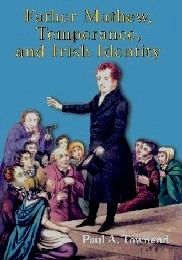
My research relates to Modern Irish history (from 1800 or so). Besides its intrinsic appeal (any people whose history cannot be told without reference to revolution, whiskey, poetry, and the potato are worth some attention!) I think Irish history offers a particularly important and often unappreciated perspective on the history of the west, and indeed of the world as an interdependent and interrelated whole. The Irish experiences of political disempowerment, cultural dislocation, and physical diaspora, are by no means unique, in and especially out of the west, but the pressures brought to bear on the people of this small island and their varied responses to them over the years (resistance, cultural and otherwise; flight; whole-hearted enthusiastic embracing of power and progress; angry (or sad) literary production, and so on) offer scholars a rich subject of study. For historians in particular, Ireland's intimate relation to broader historical trends (industrialism, imperialism, secularism, modernism and a host of other isms) as well as the two great powers of the last 300 years of history (the United Kingdom and the United States) can help all of us to think more completely and empathetically about the past. To study Ireland is to study, of necessity, connectedness and its consequences. Ireland's evolving relationship to America, to Britain, to Europe and the Atlantic world helps us to make sense of the past and the present.
My doctoral dissertation (University of Chicago, 1999) amounted to what I think about as a biography of a social movement. In 1838, a local temperance movement was inaugurated by a Capuchin Friar, Theobald Mathew, in Cork, Ireland. Mathew's small local movement mushroomed beyond all expectation; swelling by 1841 to millions of members and incorporating, within a few years time, perhaps half the adult population of Ireland. Ireland became a sober country by the early 1840's, as people changed long established customs and traditions, and drinking in public across much of Ireland virtually disappeared. The temperance crusade became the vehicle for a complicated set of ideas that related in part to traditional goals of temperance reformers active since the 1820's throughout the Atlantic world, but which primarily drew upon Irish circumstances--resentment of their political disempowerment, animosity toward England and especially towards received English ideas about the Irish, and frustration about their collective place in the world. The movement was an intensely nationalistic one, and became increasingly intertwined with Ireland's religious and political complexities. By 1843 or so, the movement began to collapse almost as rapidly as it had arisen, for reasons it would take a book to explain--so I wrote one, and Irish Academic Press in Dublin was kind enough to publish it for me. It was recently awarded the 2003 James Donnelly Prize by the American Conference on Irish Studies
My book!
Since publishing this book, I have been working on other research topics, although I always seem to come back to the development of Irish nationalism(s) and the relationship of leaders, followers, movements and ideologies in the development of what we academics like to call "identities." Recent projects have included a study of reading rooms as the common institution of a whole range of Irish national movements in the period 1838-1900 or so, and research into the relationship of elite and popular responses in Ireland to the Anglo-Zulu War of 1879-81, and reflections on the place of Irish temperance in the broader Atlantic World. Several articles are in print or will be out soon. See my C.V. for details.